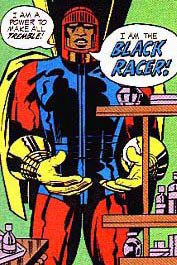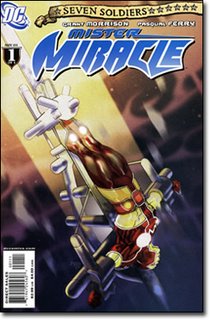Monday, January 23, 2006
The Fourth World Exception
 In my Shazam post, I lumped Kirby's Fourth World books in with some others that I think only work in the hands of the original creators, and which should be left to reprints and fond memories. But the New Gods books are a bit different, and as such have met with slightly more creative success post-Kirby--especially as supporting characters and concepts not expected to carry their own titles. As one-time Kirby assistant Mark Evanier says,
In my Shazam post, I lumped Kirby's Fourth World books in with some others that I think only work in the hands of the original creators, and which should be left to reprints and fond memories. But the New Gods books are a bit different, and as such have met with slightly more creative success post-Kirby--especially as supporting characters and concepts not expected to carry their own titles. As one-time Kirby assistant Mark Evanier says,Jack did not create the series to be a solo Kirby work. He initially intended to launch the books, hand them off to others and move on to other projects. When he found himself remaining in place, he turned them into one of his most personal creations.Unlike the Fawcett, Charlton and Quality heroes, which came to DC via trademark fire sales, Kirby's Fourth World material was actually created for--or at least initially published by DC, with Jimmy Olsen at the center of one of the books and Superman appearing here and there. Subsequent creators certanily aren't betraying any original intent on Kirby's part by reusing these ideas.
Where later creators have failed, I think, is in trying to approach the manner in which Kirby expressed himself--cartooning so idiosynchratic that it's difficult for me to fairly judge whether or not the work is inherently any good. I know I love it, I know it succeeds on its own terms, I know Kirby had a kind of genius for illustrating raw power, and a knack for coming up with demented ideas like Willie Walker's alter ego here, a cosmic angel of death on skis. It's moronic and clever, crude and beautiful all at once. And whatever else they may be, the look and feel of Kirby's comics are as hard to copy as the specific curve and weight of a Charles Schulz head. Too many writers have tried to imagine what Kirby might have thought, or how he might have used his characters in additional Fourth World stories. But nobody thinks like Jack. And it shows, every time a John Byrne makes the attempt.
Grant Morrison doesn't even try to play that game--which is why his takes on Kirby ideas so often work. Nobody thinks like him either, and he seems to have taken to heart Kirby's admonition that the only way to truly emulate him is to have your own ideas. Morrison's comics are filled to overflowing with strange notions, devices and references that I think Kirby, father of "Brain Bombs" and "Zoomways" would certainly admire.
 Morrison is currently working with three Kirby creations in his Seven Soldiers maxi-series: The Guardian, Klarion the Witch Boy, and Mister Miracle. In each case, Morrison has used the thematic building blocks of Kirby's creations--responsible cops and kid gangs, youthful rebellion, the fantasy of escape--to tell his own stories, advance his own agenda. Kirby's style has been integrated into the marrow of these comics so deeply that his influence is nearly invisible, but it's everywhere. In the dynamism of Cameron Stewart's figure work (can something be over-the-top and subtle at the same time?), in sword-wielding Rat Kings and Subway Pirates, in earnest explorations of the will to resist authority, in the use of over-muscled goons thrashing each other to get all metaphysical about the nature of reality. It all works because Morrison sees the forest for the trees--the conviction and the curiosity behind Kirby's energy dots and off-kilter perspectives. I still don't think most of these characters are capable of carrying their own ongoing titles, but then again that was true even when Kirby was producing them, and almost nothing--remake or original--can sustain a regular superhero comic in the direct market since the readers of the 70s locked the doors behind them.
Morrison is currently working with three Kirby creations in his Seven Soldiers maxi-series: The Guardian, Klarion the Witch Boy, and Mister Miracle. In each case, Morrison has used the thematic building blocks of Kirby's creations--responsible cops and kid gangs, youthful rebellion, the fantasy of escape--to tell his own stories, advance his own agenda. Kirby's style has been integrated into the marrow of these comics so deeply that his influence is nearly invisible, but it's everywhere. In the dynamism of Cameron Stewart's figure work (can something be over-the-top and subtle at the same time?), in sword-wielding Rat Kings and Subway Pirates, in earnest explorations of the will to resist authority, in the use of over-muscled goons thrashing each other to get all metaphysical about the nature of reality. It all works because Morrison sees the forest for the trees--the conviction and the curiosity behind Kirby's energy dots and off-kilter perspectives. I still don't think most of these characters are capable of carrying their own ongoing titles, but then again that was true even when Kirby was producing them, and almost nothing--remake or original--can sustain a regular superhero comic in the direct market since the readers of the 70s locked the doors behind them.Is it just that Morrison in particular is clever enough to make a creative success of anything he works on? I'm not sure. His portrayals of Captain Marvel and Plastic Man in JLA were weak, his Captain Marvel pedestrian and any points he might get for bold reinvention of Plastic Man more than negated by his decision to turn him into Jim Carrey. (While the team dynamic of JLA needed a fool, making Plastic Man be that fool seemed arbitrary.) I think Morrison simply gets Kirby* in a way that 1) most other creators do not and 2) in a way that Morrison doesn't get certain characters created by other artists. Kirby's influence is all over many of Morrison's creator-owned books, most recently Vimanarama and Seaguy.
Then again, Kirby's influence is all over most superhero comics. Perhaps his ideas have been more successfully integrated into the DC universe because superhero comics all work off of Kirby templates. Beck's Captain Marvel and Cole's Plastic Man represent entirely different strains that have almost entirely died off. Cartoonish whimsy doesn't translate--there are no words for that in the modern language of superhero comics--and Kirby wrote the dictionary.
PS with Mister Miracle #3 spoiler--scroll over to read:
*I think if Kirby had been given enough issues of Mister Miracle, he eventually would have gotten around to having the title character's dick cut off with bolt cutters.